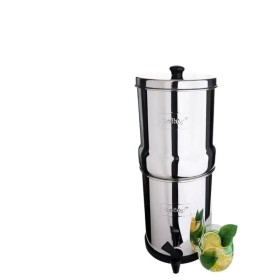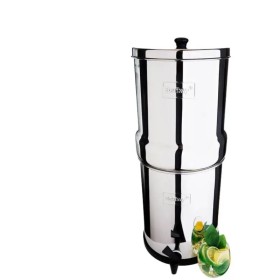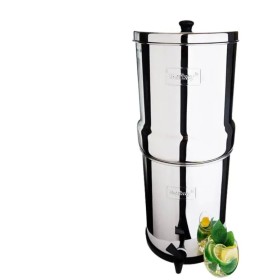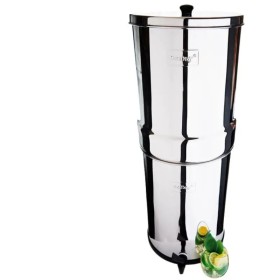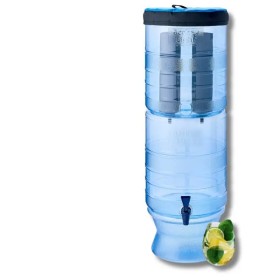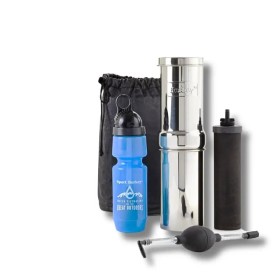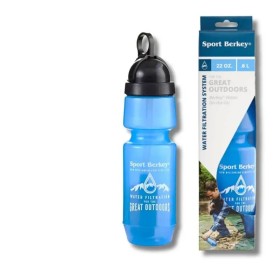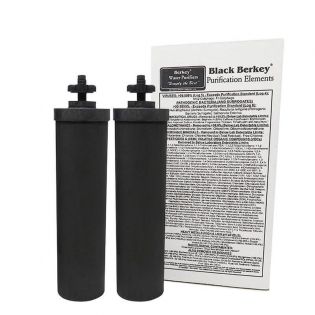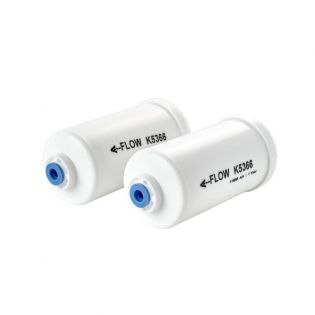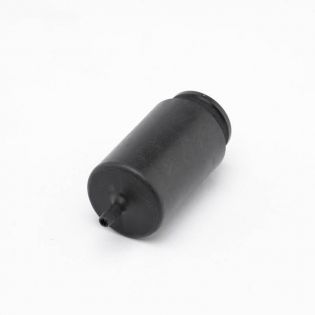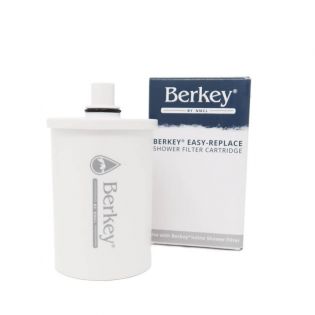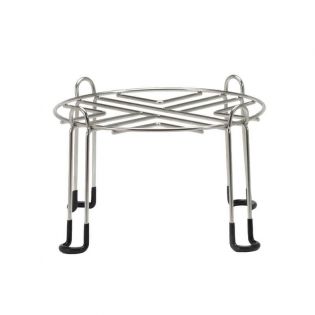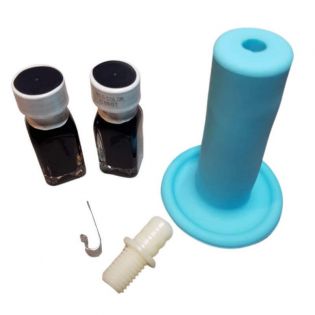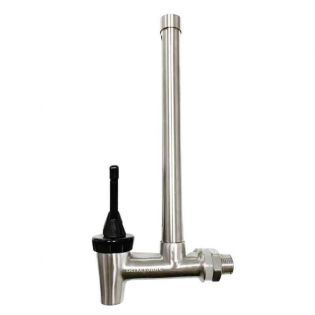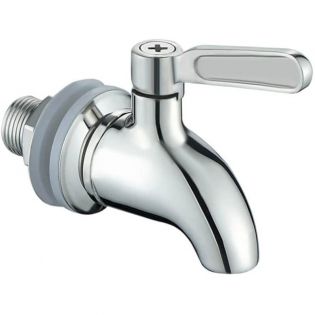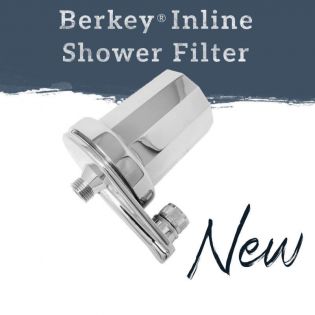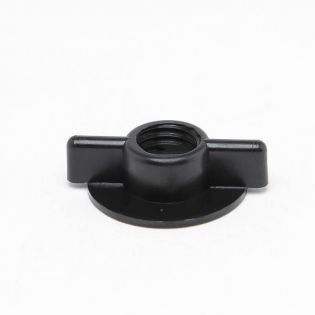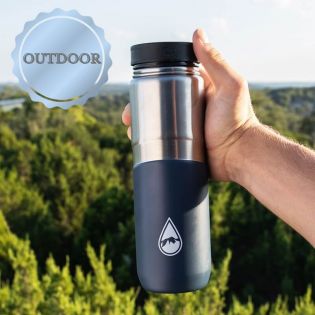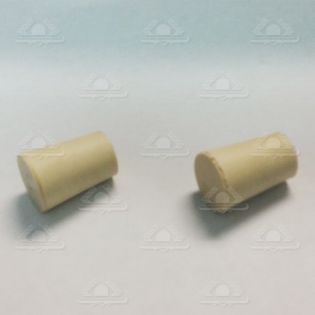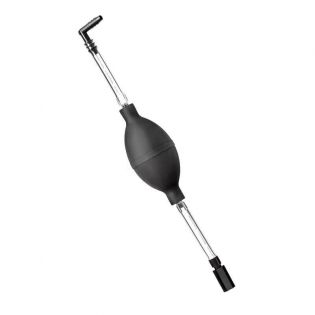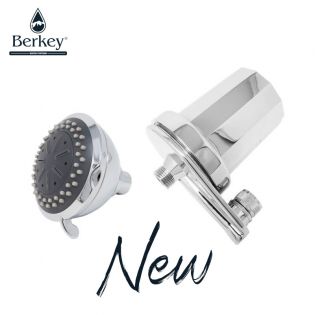Berkey® vs. Kangen
Drinking clean and pure water is the motto that everyone wants to apply to their drinking water. And for good reason, our modern world, due to its activities and the pollution it generates, faces a real challenge: finding water free of pollution. The filtration sector has experienced a real boom in recent years and many manufacturers offer devices to filter, purify and even "transform" water. For them, water is more than a simple component of our diet used to hydrate ourselves, it could also improve our health, and even cure certain diseases. So how can we make sense of the various fantasies, theories and pseudo-scientific claims, each with its own advertising and claims? Simply by clarifying what is necessary and what is not, what is relevant and what is not about water purification. In this article, we will compare the Berkey® brand water purifiers and Kangen water.
Kangen water
Alkaline ionisers have been manufactured in Japan and imported to Europe for many years. These devices produce alkaline water with a high pH, and some urban legends claim that they have healing properties and are effective against hypertension, diabetes and even cancer.
Everyone is of course free to think what they want. On the other hand, the medical community remains completely sceptical about these claims. An article in the French magazine "Sciences et avenir" states, among other things, that "No scientific publication has ever shown the slightest benefit" and "In any case, the pH in the body is very strongly regulated. Drinking water has no influence." Link to the article (in French).
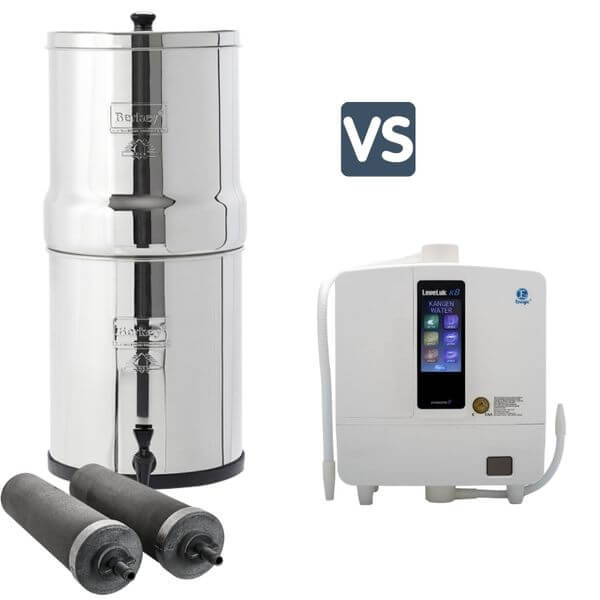
How Kangen machines work
Kangen machines are primarily ionisers, the operation of which we will explain below. In no way can these devices be called water filters, let alone purifiers, the difference between which is explained on this page. Indeed, although they contain a filtration element, their capacity to filter water is in no way comparable to the performance of the Berkey® systems or even to the other filtration systems for which we have devoted an article. The water does pass through a carbon filter, but it only removes chlorine, VOCs and bad tastes, and that's about it. The documentation states that the filter "removes many traces of unwanted agents". So beware if you use tap water containing pesticide residues, drug residues or heavy metals, these pollutants will not be removed.
Once the water has been roughly filtered, it is passed through an electrolysis chamber, which consists of passing an electric current through the water between two electrodes, one delivering a positive and the other a negative current. The ions in the water (mainly minerals) will move. Positively charged ions will be attracted to the negative electrode and negatively charged ions to the positive electrode. Through this process, and without going into further detail, the water thus transformed can have different pH values, from acidic (non-drinking) water to very alkaline, high pH water. About pH, see this page.
Filtration capacity of Kangen machines
These devices are water ionisers and are therefore not intended for water purification. Although they have a basic filter, they do not provide effective filtration. They only remove or reduce large particles, chlorine and certain VOCs. So do not use this system if you want healthy, clean water. Another disadvantage is that the purchase price is close to or exceeds €3,000 for some models, plus the price of the filters (which have a small capacity), resulting in a very high cost per litre filtered. Finally, they run on electricity (consumption of 230 watts) and require mains pressure: no autonomy in the event of a power cut or emergency situation.
| ADVANTAGE | DISADVANTAGES |
| Filtration" speed | Very high acquisition cost |
| Does not remove pathogens, chemical pollution, heavy metals or viruses | |
| High cost per litre filtered due to low filter capacity and price | |
| High electricity consumption to operate and mandatory network pressure | |
| Non-autonomous system |
Berkey® Filters
Berkey® has been manufacturing water purification systems since the 1990s, developing a strong expertise in this field. With this experience, Berkey® has become the leader in gravity filtration with a mission to provide filtered water free of pollutants. The range of water purifiers consists of eight models, for home, outdoor or mobile use, from 0.95 litres (Go Berkey®) to 22.7 litres (Crown Berkey®), a system that can filter large quantities of water. More than a million users worldwide have chosen a Berkey® system because it is efficient, its filters have a large capacity (22,700 litres per pair) and it is extremely versatile. Above all, it effectively removes many pollutants and even viruses.
How Berkey® filters work
Berkey® systems are classified as water purifiers. More specifically, they are water purifiers that work by gravity, without the need to use electric current or water pressure from a distribution network. All that is required is to fill the upper tank with water, which, by gravity, passes through the filtering elements to be purified. This water is collected in the lower tank and you simply tap it. It's that simple. And because the Black Berkey® filters used in Berkey® filtration systems are true purifiers, they remove a wide range of pollutants using three specific filtration methods: microfiltration, absorption and adsorption.
Microfiltration involves trapping unwanted elements in a microporous material, made up of millions of microchannels, which form what we call a "tortuous path". The diameter of these micro-channels is so fine that 99.9999% of bacteria, cysts or parasites are trapped in them. In order to prevent proliferation, the filter contains silver which acts as an anti-microbial agent, allowing both sterilisation of the filter and a bacteriostatic action.
Absorption takes place via an ion exchange membrane whose role is to change the chemical nature of the pollutants and thus make them inert. This is the case for petroleum products, drug residues, pesticides and heavy metals.
Finally, adsorption is an electrostatic phenomenon that allows certain elements to "stick" to the surface of the filter's microchannels and retain them permanently. To illustrate this, we can take the example of the static attraction that acts on the small polystyrene balls that stick to your hand. Thanks to this property, Berkey® filters are able to filter and retain up to 99.9999% of the viruses that may be present in drinking water.
All of these properties are achieved by the Black Berkey® filter thanks to its specific formulation, consisting of a sophisticated (and secret!) mixture of six different types of filter media, moulded into a microporous outer shell.

